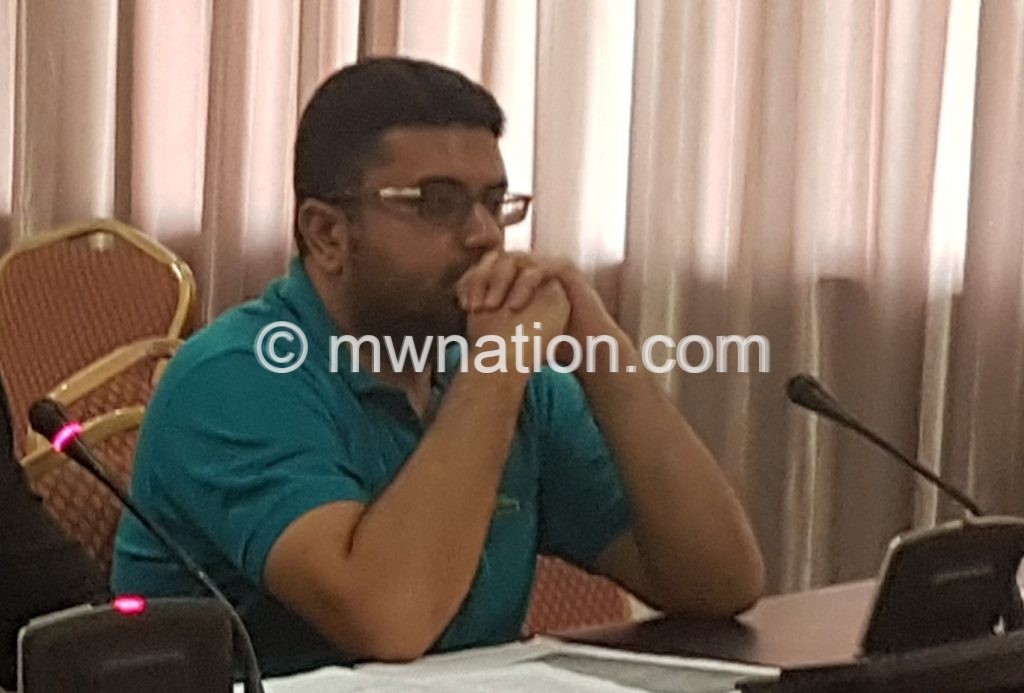Zameer loses K4bn claim
- Wanted NBS Bank to pay over breach of Fisp loan payment agreement
- Former NBS CEO cleared
The High Court’s Commercial Division in Blantyre on Thursday dismissed a claim by businessperson Zameer Karim of Oil and Protein Company Limited, who wanted NBS Bank to pay his two companies about K4 billion for the bank’s purported negligence and “breach of oral agreement”.

Delivering his judgement, Justice John Katsala disagreed with Zameer, that NBS neglected its duties and exposed him to penalties and significant loss of foreign currency following his failure to timely settle a loan amounting to $9 190 000 (about K7 billion at the current exchange rate) to PTA Bank.
The court, which also ordered Zameer to pay NBS costs for the case, exonerated, from any liability former NBS chief executive officer John Bizwick and former head of corporate banking division, Aubrey Chalera, who were dragged into the matter as third parties.

Lawyer Frank Mbeta, who partnered Chimwemwe Kalua to represent Zameer, in an interview on Friday, hinted that they had instructions from their client to file an appeal at the Malawi Supreme Court of Appeal.
Lawyers John Gift-Mwakhwawa, Davis Njobvu and Patrick Mpaka, represented NBS while their counterparts Lusungu Gondwe and Carnisius Kadyampakeni, turned up for the third parties.
The court learnt that Zameer, who had a contract with Malawi Government through his two companies—Farm-Chem Wholesalers and Astro Chemicals—to supply fertiliser under the Farm Input Subsidy Programme (Fisp), entered into a Facility Agreement with the Eastern and Southern African Trade and Development Bank (the PTA Bank), which availed an import finance facility.
Under the terms of the Facility Agreement, the court learnt, it was agreed an agent bank would be appointed, which happened to be NBS, to receive funds meant for loan repayment through a Collection Account.
“The agent bank would provide US dollars [equivalent to the funds received] and remit the funds [in US dollars] to a PTA Bank designated account to repay the claimant’s loan, together with interest, costs, commission charges and other expenses thereon,” the court’s verdict reads.
The court further learnt that the Malawi Government paid for the Fisp fertiliser in November and December 2011, but the money was not paid into the Collection Account at NBS as agreed.
“It was deposited in bank accounts for the claimant’s sister companies—Astro-Chem and Farm-Chem Wholesalers—entities which transacted the business with the Malawi Government,” reads Katsala’s judgement, stating that Zameer was a sole signatory to those bank accounts.
It was the NBS’s position, according to the judgement, that Zameer did not push the proceeds from the sale of fertiliser to Malawi Government towards the repayment of any debt under the facility with the PTA Bank and, consequently, there were no funds for purchase of US dollars in the Collection Account when time was due.
The court learnt that Zameer approached the Reserve Bank of Malawi (RBM), at the time foreign currency was scarce, and requested to buy dollars using the proceeds of fertiliser sales to government to be channelled through NBS to service the PTA Bank loan.
NBS argued that on January 13 2012, it used its own funds to buy $6 502 500 (nearly K5 billion at the current exchange rate) from RBM as the proceeds of the fertiliser sale did not go into the Collection Account at NBS.
RBM, when it released the dollars to NBS, had knowledge about Zameer’s obligation to service the PTA Bank loan and the release was based on the request the claimant made.
NBS, the court learnt, was ready and willing to prioritise the sale of these dollars to the claimant so as to use the same towards repayment of the claimant’s debt with the PTA Bank and/or to deposit this amount into the PTA Bank designated account provided.
NBS, it was learnt, ended up selling the foreign currency to other customers, claiming these dollars, having bought them using the bank’s own funds, belonged to the bank.
But Zameer claimed he entered into an oral agreement with officers of the bank [Bizwick or Chalera], in January 2012, to use the forex or part of it and refund by April 30 2012 to meet his obligation to service the PTA Bank loan, a claim both the defendant and the third parties denied.
Following the failure to service the loan on set dates, Zameer’s companies suffered penalties, loss of foreign currency following devaluation of the kwacha and termination of the facility by PTA Bank, among other claims.
Zameer argued that NBS was fully aware that his companies would suffer penalties, interest on arrears and termination of the import finance facility if the forex, or part thereof, was not remitted to the PTA Bank by April 30 2012.
The claimant contended that despite several reminders and requests, and in breach of the said oral agreement to refund the forex, or part thereof, for remittance of the same to the PTA Bank on his behalf under the said Accounts Agreement, NBS only refunded and remitted $2 005 800 (about K1.5 billion at the current exchange rate).
Zameer claimed he suffered loss on the remaining $4 496 700 following the devaluation of the kwacha on or about May 7 2012.
PTA Bank by NBS, and using other commercial banks, the claimant contended he lost K96 558 000, K15 955 164, K12 319 020 and over K1.8 billion as of January 8 2016.
Zameer said he was charged penalty interest under the Facility Agreement in the total sum of U$1 937 883.82 (over K1.4 billion) for the period between May 1 2012 and January 2016.
“The defendant was fully aware and/or ought to have been aware that due to the acute scarcity of foreign exchange in the country at the material time it was going to be very difficult to make available the said sum of U$6 502 500 or part thereof by 30 April 2012,” Zameer’s lawyers had argued.
They argued that as a result of NBS’s breach of the said tortious general duty of care to exercise reasonable care when rendering services to the claimant as its customer by failing to ensure that the foreign exchange was available for the claimant’s remittances within the repayment period, the claimant suffered loss and damage as stated.
But NBS argued that the Accounts Agreement stated that none of the terms or provisions of the agreement may be waived, altered, modified or amended in any respect except by an instrument in writing duly executed by the claimant, the defendant and the PTA Bank.
The oral agreement, which they denied existed, was considered to have fallen off by the cited clause, or was illegal.
NBS, among several other arguments, said it used K1 074 358 005.75 as the purchase price for the forex from RBM and the claimant did not repay the said sum as it did not exist in the Collection Account.
Passing his judgement, Justice Katsala said it was the court’s view that the forex belonged to NBS.
“While it cannot be denied that it is the claimant who approached the Reserve Bank for the sale of such a huge amount of forex to the defendant, the claimant did not buy the forex. It is the defendant who bought the forex.
“This was in line with the policy of the Reserve Bank, of not selling forex direct to persons other than dealer banks. The claimant did not pay to the defendant the cost of the forex,” Katsala said.
The judge said it must be remembered that the defendant, being a commercial bank, is in the business of, among other things, buying and selling of foreign currency.
“It must also be remembered that the defendant bought the forex specifically for resell to the claimant. It was not bought on behalf of the claimant, or to be donated to the claimant or to be shared with the claimant,” he said.
“I do not agree that what the claimant did, in facilitating the defendant’s purchase of the forex, was sufficient to confer on the claimant any beneficial interest in the forex.
“It is my considered view that what the claimant did towards the defendant’s purchase of the forex from the Reserve Bank only conferred on the claimant the right to the first option to buy the forex from the defendant. It was entirely up to the claimant to exercise that option or not,” the court observed.
He said the claimant was required to put money into the Collection Account and then the defendant was to purchase forex equivalent to the amount deposited and remit it to the PTA Bank designated account.
Katsala said Zameer did not tell the court where the money government paid for fertiliser was channelled to. He, therefore, dismissed the case.





